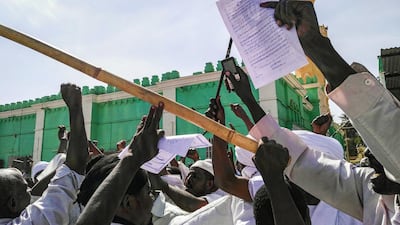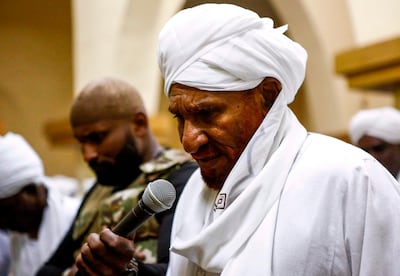Sudan's main opposition leader Sadiq Al Mahdi has called for President Omar Al Bashir to step down, throwing his support behind anti-government demonstrators after weeks of deadly protests.
Demonstrations have rocked the east African country since December 19, prompted by a government decision to triple the price of bread.
Since then 30 people have died in protest-related violence, according to officials, while rights group put the death toll at more than 40.
"This regime has to go immediately," Mr Al Mahdi told hundreds of worshippers attending Friday prayers at a mosque in Omdurman, the twin city of the capital Khartoum, which has seen near daily anti-government protests.
Mr Al Mahdi, whose government was toppled by Mr Al Bashir in a 1989 coup, has been a fixture of Sudanese politics since the 1960s. After nearly a year in exile, he returned to Sudan last month on the same day protests began.
Echoing calls by protesters for Mr Al Bashir to resign, the opposition chief gave an even higher death toll for the demonstrations.
"More than 50 people have been killed since December," said Mr Al Mahdi,
He backed the Sudanese Professionals' Association (SPA), an umbrella group of doctors, teachers and engineers which is leading demonstrations.
"A period of transition will come soon ... we are supporting this movement," said Mr Al Mahdi.
He said his party had signed "a document for change and freedom" with the SPA.
While Mr Al Mahdi's Umma Party has served as Sudan's main opposition group, regularly campaigning against government policies, analysts say the SPA-led protest movement has emerged as the biggest challenge yet to Mr Al Bashir's rule.
"Together we will hold peaceful demonstrations in Sudan and outside of Sudan," Mr Al Mahdi said, condemning the use of "live ammunition" against protesters.
Following Mr Al Mahdi's address, worshippers marched out of the mosque chanting the protest movement's slogan: "freedom, peace, justice".
But the demonstrators were quickly confronted by riot police who fired tear gas, witnesses said.
Protesters also took to the streets in Khartoum's eastern district of Burri, burning tyres and rubbish, according to onlookers who said the rally was also met with tear gas.
Late on Friday, protesters rallied in the capital's southern neighbourhoods of El Kalakla and Soba but there too they were confronted with tear gas, witnesses said.
"There were some illegal gatherings today in Khartoum and some other states but they were dispersed using tear gas," police spokesman General Hashim Abdelrahim said.
The SPA has stepped up pressure on the government with calls for daily demonstrations. Sudan's feared National Intelligence and Security Service has launched a sweeping crackdown on protesters that has seen hundreds jailed, including journalists, opposition leaders and activists.
This has triggered widespread international criticism, including from the United Nations and the United States.
Mr Al Bashir, 75, has remained steadfast in rejecting calls from demonstrators to step down, and has blamed "infiltrators" among the protesters for the violence.
He has accused the US of causing Sudan's economic woes, but his words have fallen on increasingly deaf ears as people have struggled to buy even basic foods and medicines.
Washington imposed a trade embargo on Sudan in 1997, which was only lifted in October 2017.
COMPANY%20PROFILE%20
%3Cp%3E%3Cstrong%3EName%3A%3C%2Fstrong%3E%20Dooda%20Solutions%0D%3Cbr%3E%3Cstrong%3EBased%3A%3C%2Fstrong%3E%20Lebanon%0D%3Cbr%3E%3Cstrong%3EFounder%3A%20%3C%2Fstrong%3ENada%20Ghanem%0D%3Cbr%3E%3Cstrong%3ESector%3A%3C%2Fstrong%3E%20AgriTech%0D%3Cbr%3E%3Cstrong%3ETotal%20funding%3A%20%3C%2Fstrong%3E%24300%2C000%20in%20equity-free%20funding%0D%3Cbr%3E%3Cstrong%3ENumber%20of%20employees%3A%3C%2Fstrong%3E%2011%3C%2Fp%3E%0A
Our family matters legal consultant
Name: Hassan Mohsen Elhais
Position: legal consultant with Al Rowaad Advocates and Legal Consultants.
Labour dispute
The insured employee may still file an ILOE claim even if a labour dispute is ongoing post termination, but the insurer may suspend or reject payment, until the courts resolve the dispute, especially if the reason for termination is contested. The outcome of the labour court proceedings can directly affect eligibility.
- Abdullah Ishnaneh, Partner, BSA Law
More from Neighbourhood Watch:
Batti Gul Meter Chalu
Producers: KRTI Productions, T-Series
Director: Sree Narayan Singh
Cast: Shahid Kapoor, Shraddha Kapoor, Divyenndu Sharma, Yami Gautam
Rating: 2/5
Specs
Engine: Dual-motor all-wheel-drive electric
Range: Up to 610km
Power: 905hp
Torque: 985Nm
Price: From Dh439,000
Available: Now
The candidates
Dr Ayham Ammora, scientist and business executive
Ali Azeem, business leader
Tony Booth, professor of education
Lord Browne, former BP chief executive
Dr Mohamed El-Erian, economist
Professor Wyn Evans, astrophysicist
Dr Mark Mann, scientist
Gina MIller, anti-Brexit campaigner
Lord Smith, former Cabinet minister
Sandi Toksvig, broadcaster
65
%3Cp%3E%3Cstrong%3EDirectors%3A%20%3C%2Fstrong%3EScott%20Beck%2C%20Bryan%20Woods%3C%2Fp%3E%0A%3Cp%3E%3Cstrong%3EStars%3A%20%3C%2Fstrong%3EAdam%20Driver%2C%20Ariana%20Greenblatt%2C%20Chloe%20Coleman%3C%2Fp%3E%0A%3Cp%3E%3Cstrong%3ERating%3A%20%3C%2Fstrong%3E2%2F5%3C%2Fp%3E%0A
Yemen's Bahais and the charges they often face
The Baha'i faith was made known in Yemen in the 19th century, first introduced by an Iranian man named Ali Muhammad Al Shirazi, considered the Herald of the Baha'i faith in 1844.
The Baha'i faith has had a growing number of followers in recent years despite persecution in Yemen and Iran.
Today, some 2,000 Baha'is reside in Yemen, according to Insaf.
"The 24 defendants represented by the House of Justice, which has intelligence outfits from the uS and the UK working to carry out an espionage scheme in Yemen under the guise of religion.. aimed to impant and found the Bahai sect on Yemeni soil by bringing foreign Bahais from abroad and homing them in Yemen," the charge sheet said.
Baha'Ullah, the founder of the Bahai faith, was exiled by the Ottoman Empire in 1868 from Iran to what is now Israel. Now, the Bahai faith's highest governing body, known as the Universal House of Justice, is based in the Israeli city of Haifa, which the Bahais turn towards during prayer.
The Houthis cite this as collective "evidence" of Bahai "links" to Israel - which the Houthis consider their enemy.
A little about CVRL
Founded in 1985 by Sheikh Mohammed bin Rashid, Vice President and Ruler of Dubai, the Central Veterinary Research Laboratory (CVRL) is a government diagnostic centre that provides testing and research facilities to the UAE and neighbouring countries.
One of its main goals is to provide permanent treatment solutions for veterinary related diseases.
The taxidermy centre was established 12 years ago and is headed by Dr Ulrich Wernery.


